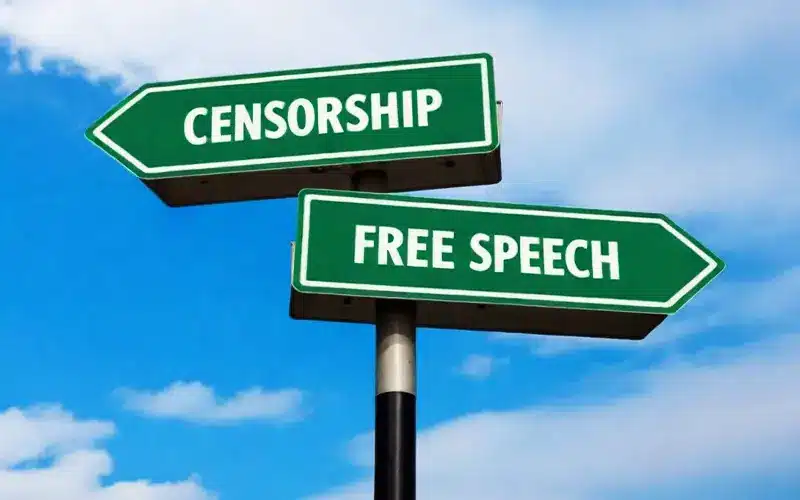For decades our source of information, entertainment, and news has been the mainstream media. However, with the advent of social media, the power of what we consume and how we interact has been transferred into our hands.
Indeed, social media has broken the glass ceiling and given the masses equal access to information and entertainment which was erstwhile controlled by a handful of powerful elites. The rise of Facebook, Twitter, Instagram and YouTube are testimony to the fact that information is the new gold of 21st century, which is equally accessible to all.
According to a report by Smart Insights, over half of the world’s population or 5.04 billion people use social media. This shows the potential that social media has to direct and influence the behavior of the world.
Despite the radical transformations that social media is causing, there remains a crucial challenge that social media platforms today are facing – censorship.
Censorship on social media is directly affecting how we consume information (or misinformation) and news as a few people choose what to erase from viewers. Nonetheless, censorship on social platforms has its advantages regardless of the massive campaigns against it. Censorship can be important in protecting users from harmful and inappropriate content such as hate speech, violence, and misinformation. Additionally, it can help prevent the spread of illegal or harmful activities, such as child exploitation or terrorism. Censorship has also been used to control ‘law and order’ situations in many developing nations.
However, if used wrongly, censorship can lead to diminishing the freedom of expression and access to different viewpoints. One example is the widespread censorship of posts made on the COVID-19 virus across platforms such as Facebook and Instagram which saw thousands of posts regarding the virus deleted and suppressed in an “unprecedented campaign to police falsehoods and misinformation”.
The million-dollar question remains, “How should Big Tech approach censorship and should they be the guardians of what people can and can’t say online?”
Governments’ misuse of censorship on social media platforms
When social media became popular in the mid-2000s, little to no censorship was required as no one was particularly worried about its greater impact. Fast-forward to 2024 and social media has become a tool that has started revolutions, changed elections’ trajectories, influenced policies and brought greater scrutiny to public welfare.
This has led to increased scrutiny on social media from many governments worldwide. Governments have used censorship on social media to stifle freedom of speech and expression, creativity, and inhibit the free flow of information. Once touted as the agents of democratisation and heralded by activists as the champions for protests, social media platforms have turned into agents of fear and surveillance – especially across countries with a record of repression.
Pakistan, Iran, China, and Russia have banned the social messaging platform, Telegram citing the encrypted messaging platform as a danger to national security. Twitter and Facebook have been banned in China as well, and VPN services providing access to these social media platforms have been banned.
While these countries have outrightly banned social platforms in their countries, a new form of ‘censorship’ has crept into other countries. For example, instead of banning X or Twitter, Saudi Arabia chose to embrace the platform in quite a peculiar way.
Twitter, which has been extensively used to champion women’s rights across the Kingdom, faced a shift within the country.
The Saudi government resorted to hiring people and bots to tweet against the activists in the form of online bullying, as reported by the New York Times in 2017. In the capital Riyadh, employees of the Kingdom were tasked to “intervene in online conversations on themes including the war in Yemen and women’s rights”.
A New Age of Anti-Censorship and Freedom of Speech
The widespread misuse of censorship by governments wishing to control the freedom of speech and expression calls for an innovation that gives social media users full control over their speech. Luckily, the launch of blockchain allows users to own and control their data without the interference of a third party, whether the government or Big Tech companies.
One such company is Phaver, a Web 3 decentralized social app that offers users the ability to control their own social graph. Its permissionless and non-custodial ecosystem ensures information can be accessed directly by users, removing any chances of censorship – creating a new age of the internet. Built on a blockchain, Phaver allows anyone with an internet connection to interact and share information freely, without third-party interference.
Users on the platform can broadcast posts to blockchain social networks – currently supporting Aave’s Lens protocol and CyberConnect – after minting and connecting an on-chain decentralized profile, for additional reach and immutability.
Adding to its decentralization and anti-censorship properties, Phaver also diverts the power back to the user, allowing them to earn from their posts and maximize their utility when socializing online. Similar to Reddit, the platform also allows users to create gated communities based on various rules and on-chain assets.
Crucially, users can also send wallet-to-wallet direct encrypted messages, bypassing any third-party who may wish to censor and control their freedom of speech and expression.
Finally, as a “Web 2.5” app, Phaver gives users the ability to log in similar to traditional social apps and needs no wallet, allowing them to onboard users to Web3 step-by-step.
What does the future hold for Web 3 social platforms?
The future of Web 3 social media platforms is likely to be characterized by greater decentralization, user empowerment, and innovative uses of blockchain technology. While censorship rows and debates are expected to continue deep into the decade, Web 3 social media platforms will offer users a breath of new life on how to interact online.
The future of Web 3 social platforms holds promise for decentralization, enhanced privacy, and greater user control over data. However, challenges such as scalability, usability, and regulatory concerns will need to be addressed for these platforms to reach mainstream adoption.






